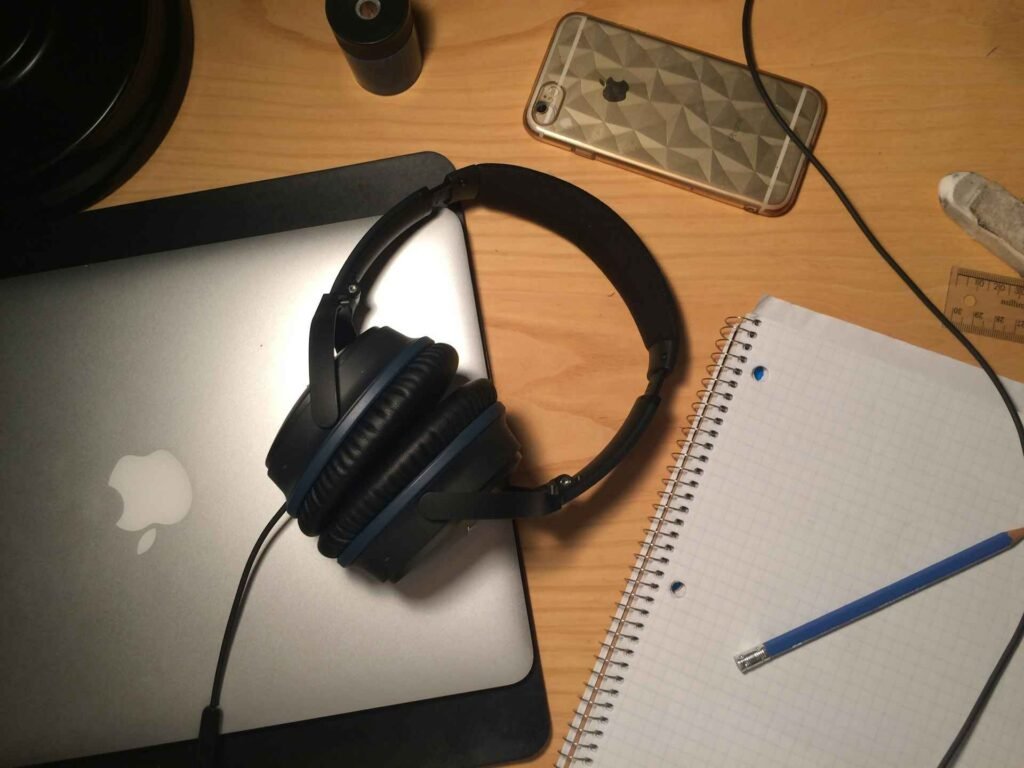Does Music Help Productivity? What Music Works Best

We’ve all been there: staring at a screen, willing our brain to cooperate, when suddenly the right song comes on and everything clicks. But is this just a coincidence, or does music actually help productivity? The answer turns out to be way more interesting (and complicated) than a simple yes or no.
Let’s dive into what really happens when you press play during work hours, and whether your favorite tunes are secret productivity weapons or just pleasant distractions.
The Real Connection Between Music and Work Performance
Here’s the thing about music and productivity: it’s not a one-size-fits-all situation. Some people swear by their carefully curated focus playlists, while others need total silence to get anything done. The reality sits somewhere in between, depending on what you’re doing and how your brain works.
Research shows that music can genuinely boost your performance, but only under certain conditions. When you’re tackling repetitive tasks or doing work that doesn’t require heavy mental lifting, music often enhances both speed and accuracy. Think data entry, organizing files, or routine administrative work. These tasks tend to bore our brains into submission, and music provides just enough stimulation to keep us engaged without overwhelming our cognitive resources.
However, when you’re writing a complex report, solving intricate problems, or learning something brand new, music might actually work against you. The same mental bandwidth that processes melodies and lyrics is also needed for language-based tasks and deep thinking. It’s like trying to have two conversations at once, something’s got to give.
When Does Music Affect Productivity Positively?
The sweet spot for musical enhancement happens during what researchers call “moderate complexity” tasks. These are activities that require attention but don’t demand your absolute peak brainpower. Assembly line work, cleaning, organizing physical spaces, or sorting through emails all fall into this category.
Music also shines when you need an emotional boost. Having a rough day? The right playlist can shift your mood from “I hate everything” to “let’s tackle this” faster than your third cup of coffee. This mood regulation might be music’s biggest superpower in the workplace. When you feel better, you naturally work better, even if the music isn’t directly improving your cognitive function.
Another win for team music: it can create a sense of shared experience in group settings. Playing upbeat background music in common areas often improves the overall atmosphere, though individual workspaces with noise-canceling headphones give people control over their own auditory environment.
The Downsides: When Music Becomes a Distraction
Now for the reality check. Music doesn’t always increase productivity, and sometimes it actively hurts performance. Tasks requiring reading comprehension, memorization, or complex problem-solving typically suffer when music enters the picture. Your brain only has so much processing power, and splitting it between competing audio streams reduces what’s available for the main event.
Lyrics are the biggest culprits here. When you’re trying to write or read, your language processing centers are already working overtime. Add song lyrics into the mix, and you’ve essentially asked your brain to juggle while riding a unicycle. Some people can pull it off, but most of us will drop a ball (or several).

New or unfamiliar music also tends to steal focus. That catchy new album might sound amazing, but if you’re constantly perking up to catch interesting musical passages, you’re not fully concentrating on your work. Your attention keeps ping-ponging between the task and the tunes.
What Type of Music Increases Productivity Most?
Alright, so if you want to harness music’s benefits while avoiding the pitfalls, what should you actually listen to? The answer depends on your task, but some general patterns emerge.
Classical Music and Concentration
Does classical music help you concentrate? It certainly can. Instrumental classical music, particularly baroque pieces with steady tempos, provides rhythmic structure without linguistic interference. The famous “Mozart Effect” got a bit overhyped in popular culture, but there’s truth to the idea that certain classical compositions create a productive mental environment.
The key with classical music is predictability. Familiar pieces with consistent patterns let your brain process the music on autopilot, leaving your conscious attention free for work. Dramatic symphonies with sudden crescendos and tempo changes? Maybe save those for your commute.
Ambient and Electronic Focus Music
Does focus music work? Purpose-designed focus music, often categorized as ambient, lo-fi, or electronic, strips away the distracting elements while maintaining engaging soundscapes. These genres typically feature:
- Minimal or no lyrics
- Repetitive patterns that fade into the background
- Moderate tempos (around 60-70 beats per minute)
- Consistent volume levels without sudden changes
Think of it as sonic wallpaper, pleasant enough to mask distracting environmental noises, but structured to avoid grabbing your attention. Many people find that ambient lighting paired with the right audio creates an ideal focus environment, especially when working from home where you can control more variables.
Personal Favorites and the Familiarity Factor
Here’s where it gets personal: music you know well almost always works better than new discoveries. Your brain has already mapped out familiar songs, so processing them requires minimal effort. This is why so many people have that one album they’ve listened to a thousand times that somehow makes everything feel easier.

Your favorite upbeat playlist might violate every “scientifically optimal” rule but still boost your productivity simply because you associate it with getting things done. Never underestimate the power of positive associations and ritual. If listening to 90s hip-hop tricks your brain into work mode, who cares if it’s “optimal” according to studies?
How Music Affects Your Productivity Throughout the Day
Timing matters more than most people realize. How does music affect your productivity changes depending on your energy levels, the time of day, and what you’re trying to accomplish.
Morning vs. Afternoon Listening
Morning work sessions often benefit from energizing music that helps you shake off sleep and engage with tasks. Upbeat tempos and major keys can substitute for that slow caffeine kick-in period. As the day progresses and decision fatigue sets in, switching to calmer, more ambient sounds helps maintain focus without adding extra stimulation to an already tired brain.
Many people find their attention spans naturally shorter in the afternoon. This is actually when strategic music use becomes most valuable. The right background music can power you through that 3 PM slump when your brain would rather be literally anywhere else. Consider keeping a smart timer lamp on your desk that automatically adjusts lighting, creating environmental cues that complement your playlist choices.
Task-Switching and Musical Transitions
Here’s a productivity hack that doesn’t get enough attention: use specific songs or playlists as transition markers between different types of work. When you switch from email management to creative writing, changing your audio environment signals to your brain that you’re entering a different mental mode.
This works particularly well when you’re alternating between high-focus tasks and administrative work. Queue up your instrumental focus music for the demanding stuff, then switch to something more engaging during routine tasks. The musical shift reinforces the mental shift, helping you reset between different work modes.
Music in the Workplace: Shared Spaces vs. Personal Choice
Does music in the workplace increase productivity? This question gets complicated when multiple people share the same space. What helps one person concentrate might drive another person up the wall.
The Open Office Challenge
Open floor plans already present enough acoustic challenges without adding music to the equation. Background music in shared workspaces tends to work best when it’s quiet, neutral, and genuinely stays in the background. Think hotel lobby, not nightclub.
The bigger question is whether workplace music should be communal at all. Most productivity gains from music come from personal choice and control. Forcing everyone to listen to the same thing eliminates that crucial element of autonomy. This is where quality USB charging stations at each desk become valuable, ensuring everyone can keep their personal headphones charged and ready to create their own ideal audio environment.

Related read: Trackball Mouse vs Vertical Mouse
The Case for Headphones
Personal headphones solve most workplace music conflicts. They give individuals control over their auditory environment while signaling to others that someone’s in focus mode. The simple act of putting on headphones creates a psychological boundary that often reduces interruptions even more than the music itself.
Wireless options have made this even easier, though some people prefer the reliability of wired connections, especially when their they keep disconnecting and interrupting their flow. Nothing kills productivity quite like your audio cutting out mid-sentence during a crucial thought.
Music and Different Personality Types
Your mileage may vary significantly based on who you are. Introverts and extroverts often respond differently to musical stimulation. Extroverts typically handle (and sometimes prefer) more complex, stimulating music while working, whereas introverts more often benefit from simpler, quieter soundscapes.
People with attention challenges sometimes find that music helps provide structure and reduces environmental distractions, though this varies individually. What works is deeply personal, which is why blanket rules about workplace music rarely satisfy everyone.
Age and generational factors also play a role. Younger workers who grew up with constant audio stimulation might find silence more distracting than music, while older colleagues might have the opposite experience. Neither approach is wrong; they’re just different based on what feels “normal.”
Does Music Really Help You Concentrate? The Verdict
So, does music really help you concentrate, or have we all been fooling ourselves? The honest answer: it depends, but probably yes for most people in most situations.
Music’s concentration benefits are real but conditional. You need the right type of music for the right type of task at the right volume. Instrumental music during repetitive work? Almost certainly helpful. Death metal during financial analysis? Probably not your best move (though hey, if it works for you, rock on).
The bigger picture is that music offers indirect concentration benefits through mood regulation, environmental noise masking, and routine establishment. Even when music doesn’t directly improve cognitive performance, it often creates conditions that make concentrating easier. A better mood, fewer distractions, and established work rituals all contribute to productivity in ways that are harder to measure but equally valuable.
Creating Your Perfect Productivity Playlist
Building an effective work playlist requires some experimentation, but here are some practical guidelines to get started:
Match Music to Task Complexity:
- Simple, repetitive tasks: Upbeat music with lyrics is fine
- Moderate complexity work: Instrumental music with rhythm
- High complexity tasks: Ambient sounds or silence
- Creative work: Familiar music that inspires without distracting
Consider Volume Levels: Music should never dominate your attention. If you’re noticing the music more than your work, it’s too loud or too interesting. Aim for background presence rather than foreground entertainment. Many people find that setting volume just below their natural speaking level works well.
Build Multiple Playlists: Create different playlists for different work modes. You might have one for email processing, another for focused writing, and a third for those days when everything feels impossible and you need extra motivation. Having options prevents audio fatigue from listening to the same songs repeatedly.

Account for Your Environment: If you work in a noisy environment, music serves double duty by masking distractions. In this case, you might need slightly more engaging music to override background noise. A quiet home office allows for subtler audio choices.
Related read: The Best Office Temperature for Productivity
Common Mistakes People Make with Work Music
Even with good intentions, several common pitfalls reduce music’s productivity benefits:
Discovering New Music While Working: Save exploration for leisure time. Unfamiliar music demands more cognitive resources as your brain processes novel patterns and tries to predict what comes next. Stick with music you already know during work hours.
Choosing Music Based on Personal Meaning: That song from your high school prom might trigger a 15-minute nostalgia spiral. Emotionally loaded music hijacks your attention with memories and associations. Save the meaningful tracks for your personal time and choose emotionally neutral options for work.
Fighting Your Own Preferences: If you hate classical music, forcing yourself to listen to it because some article said it’s “optimal” won’t help. Annoying yourself is counterproductive. Find what works within the general guidelines rather than following prescriptive rules that don’t match your tastes.
Ignoring Fatigue Signals: Audio fatigue is real. If you notice increasing irritation with your music, your brain needs a break. Switch to silence periodically to give your auditory processing centers a rest. Pushing through audio fatigue leads to general fatigue and reduced productivity.
Music for Specific Work Scenarios
Let’s get practical with some common work situations:
Video Calls and Meetings: Obviously, silence your music during calls. However, playing calming music in the moments between meetings helps reset your mental state. Those five-minute gaps are perfect for a quick musical mood adjustment before jumping into the next conversation.
Creative Brainstorming: Contrary to focus work, creativity sometimes benefits from more stimulating music that sparks unexpected associations. Moderate volume music with interesting but not overwhelming complexity can enhance divergent thinking. Just remember to switch back to calmer music when you need to execute on those creative ideas.
Learning New Skills: Does music help you concentrate while studying? Generally, no. Acquiring new information requires significant cognitive resources, and music competes for those same resources. However, music can help during study breaks, providing emotional regulation that prepares you for the next learning session.
Physical Tasks at Your Desk: When you’re organizing papers, arranging your workspace, or doing other physical desk tasks, upbeat music with energy can make these activities feel less tedious. This is one situation where lyrics typically don’t interfere since you’re not processing language-based information.
FAQ
Does listening to music while working actually improve performance?
Yes, but with important qualifications. Music improves performance on repetitive, routine tasks and can boost mood, which indirectly enhances productivity. However, music often reduces performance on complex cognitive tasks, especially those involving language processing or learning new information. The key is matching music type to task type.
What genre of music is best for productivity?
Instrumental genres typically work best, including classical, ambient, electronic, and jazz without vocals. The optimal choice depends on personal preference and task requirements. Familiar music generally outperforms unfamiliar music regardless of genre, and simpler musical structures usually beat complex arrangements during focused work.
Can music help with concentration for people who have attention challenges?
Music can help some people with attention difficulties by providing structure and masking distracting environmental stimuli. However, responses vary individually. Some find that music reduces their ability to concentrate. Experimentation with different music types and volume levels helps determine what works for each person.
Should I listen to music with lyrics while working?
Lyrics work fine for non-language tasks but typically interfere with reading, writing, or verbal communication. If your work involves processing words (whether reading reports or composing emails), instrumental music serves you better. Save lyrical music for physical tasks, data entry, or routine administrative work.
How loud should work music be?
Work music should stay in the background, barely noticeable when you’re deeply focused. A good rule of thumb is setting volume slightly below conversational level. If you’re actively noticing the music rather than your work, it’s too loud. The goal is ambient presence, not foreground entertainment.
Does classical music really make you smarter or more productive?
The “Mozart Effect” suggesting classical music increases intelligence was largely overstated. However, classical music can create a productive work environment for many people because it’s instrumental, often familiar, and provides rhythmic structure without linguistic interference. It doesn’t make you smarter, but it can help you work more effectively under the right circumstances.
Finding Your Personal Productivity Sound
At the end of the day, the question “does music help productivity” has a frustratingly personal answer. What works brilliantly for your colleague might drive you to distraction. The science gives us general principles, but you need to run your own experiments.
Start by paying attention to how you feel and perform with different musical choices during different tasks. Keep mental notes (or actual notes) about what works and what doesn’t. Build your understanding gradually rather than expecting immediate results.
The beautiful thing about living in the streaming era is that testing different approaches costs nothing but time. Try a week with baroque classical, then a week with ambient electronic, then a week with your favorite familiar albums. Track your subjective sense of productivity and see what patterns emerge.
Remember that your needs might change over time, across different projects, or even based on how well you slept last night. Flexibility beats rigid rules. The best productivity system adapts to you rather than forcing you to adapt to it.
Looking for more? Check out our productivity tools category for more articles and guides that may interest you!
Featured image credit: Photo by Vitaly Gariev on Unsplash
This content is for informational purposes only. Please verify current information directly on the retailer’s site before purchasing.
References:
Sanseverino D, Caputo A, Cortese CG, Ghislieri C. “Don’t Stop the Music,” Please: The Relationship between Music Use at Work, Satisfaction, and Performance. Behav Sci (Basel). 2022 Dec 24;13(1):15. https://doi.org/10.3390/bs13010015






